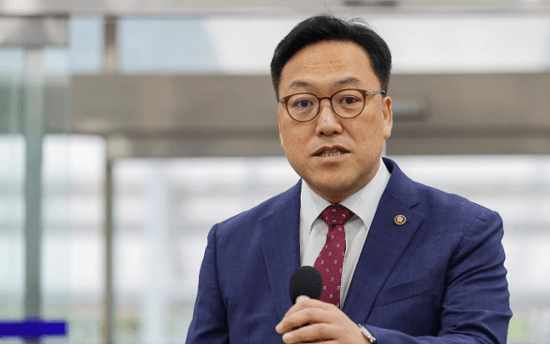First Vice Finance Minister Kim Byoung-hwan, nominee for chairman of the Financial Services Commission (FSC), expressed his concerns over the country’s slated implementation of a financial investment income tax early next year. During a press conference held in central Seoul, Kim stated that the tax scheme will negatively affect the country’s capital markets.
“From the perspective of revitalizing the capital markets as well as fostering mutual growth for both businesses and the public, the introduction of the financial investment income tax can only have a negative impact,” Kim said. “As I believe it is necessary to scrap the financial investment income tax scheme, I plan to provide any help that I can as chief of the FSC in the legislative review process of the tax bill, after officially taking office.”
Corporate Value-up Initiative
With regard to the government-led Corporate Value-up Initiative aimed at addressing the so-called “Korea discount” — a persistent undervaluation of Korean stocks — the FSC head nominee emphasized that the program will benefit both corporations and shareholders.
“Some have raised doubts about whether the Value-up Initiative’s tax incentives are strong enough. However, I think corporations will be able to directly assess the program’s effectiveness once the law is implemented,” Kim said, showing his confidence in the tax support program.
In March this year, Finance Minister Choi Sang-mok announced that the government would ease the corporate tax burden on companies that increase shareholder returns through dividend payments or share buybacks. In early July, the Korean government revealed a specified tax benefit plan, which included deducting 5 percent of companies’ increased amount of shareholder returns from their corporate taxes.
The nominee highlighted that his key tasks, once he assumes the financial leadership post, will include managing the real estate project financing crisis, addressing mounting debts held by self-employed small business owners, tackling household debt, and ensuring the soundness of the secondary financial sector.
“As high interest rates and inflation persist, risks are accumulating, particularly around vulnerabilities in the current financial system. The top priority will be minimizing the potential negative impacts of these risk factors on the market and economy without causing significant shock,” Kim stressed.
He also pointed to the need to change the country’s heavy reliance on debt, saying: “The Korean economy and financial system exhibit an excessive dependence on debt, which is reflected in a significantly higher total debt leverage ratio compared to other countries. This poses sustainability concerns and could lead to a systemic transmission in the event of external shocks.”
Meanwhile, the nominee anticipates effective cooperation with Financial Supervisory Service (FSS) Governor Lee Bok-hyun, who was his junior by one year at their alma mater, Seoul National University where both studied economics.
“The FSC and the FSS are institutions that must cooperate structurally. Following the institutional framework, I will work closely with the FSS to contribute to financial market stability and industrial development,” Kim said.






